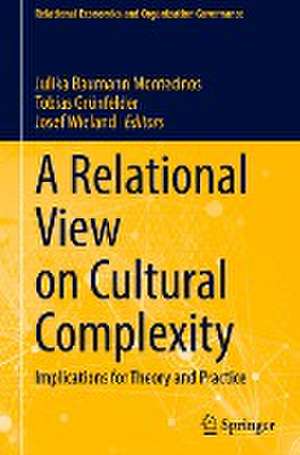A Relational View on Cultural Complexity: Implications for Theory and Practice: Relational Economics and Organization Governance
Editat de Julika Baumann Montecinos, Tobias Grünfelder, Josef Wielanden Limba Engleză Hardback – 2 iun 2023
The book is divided into four parts, the first of which introduces readers to the relational view. In turn, the second part elaborates on transcultural competence, while the third presents various case studies and field reports on experience-based learning and relationality in culturally complex settings. Finally, the fourth part sheds new light on relational leadership and the role of commonalities in organizational practice. As such, this book will appeal to scholars and practitioners in the areas of cultural and relational economics, intercultural communication, business strategy and leadership, and organizational studies.
Preț: 1100.19 lei
Preț vechi: 1341.69 lei
-18% Nou
Puncte Express: 1650
Preț estimativ în valută:
210.65€ • 219.35$ • 174.78£
210.65€ • 219.35$ • 174.78£
Carte tipărită la comandă
Livrare economică 15 februarie-01 martie
Preluare comenzi: 021 569.72.76
Specificații
ISBN-13: 9783031274534
ISBN-10: 3031274539
Ilustrații: XI, 389 p. 29 illus., 14 illus. in color.
Dimensiuni: 155 x 235 mm
Greutate: 0.74 kg
Ediția:2023
Editura: Springer International Publishing
Colecția Springer
Seria Relational Economics and Organization Governance
Locul publicării:Cham, Switzerland
ISBN-10: 3031274539
Ilustrații: XI, 389 p. 29 illus., 14 illus. in color.
Dimensiuni: 155 x 235 mm
Greutate: 0.74 kg
Ediția:2023
Editura: Springer International Publishing
Colecția Springer
Seria Relational Economics and Organization Governance
Locul publicării:Cham, Switzerland
Cuprins
Part I. Shifting towards a Relational View.- Chapter 1. Delphi Study on Transcultural Competence: Summary and Reflections on a Call for a Relational Approach (Tobias Grünfelder).- Chapter 2. The Relational Roots of Intercultural Communication (Milton J. Bennett).- Chapter 3. In Search of Commonalities: Thoughts on Ubuntu and the Transcultural Approach (Yolande Steenkamp).- Chapter 4. A Relational View on Culture and Transculturality (Gert Jan Hofstede).- Chapter 5. Transcultural Competence and Relational Costs (Josef Wieland).- Part II. Elaborating on Transcultural Competence.
Notă biografică
Julika Baumann Montecinos is a professor of intercultural management at the Business School of Furtwangen University and coordinator of the Transcultural Caravan Network at Zeppelin University. Her research focuses on relational economics, particularly on the success factors of cooperation in contexts of cultural complexity. She develops international teaching, training, research and networking formats that centre on concepts of transcultural competence.
Tobias Grünfelder is a research fellow and PhD student at the chair of institutional economics at Zeppelin University’s Leadership Excellence Institute (Germany). He is a project manager of the Transcultural Caravan Network, a platform for student research, global thinking, networking, and exchange. His research focuses on relational economics and the conditions and determinants of productive transcultural leadership and cooperation. As a lecturer, facilitator, and magician, he develops transculturallearning experiences for individuals and groups.
Josef Wieland is a professor of institutional economics, organisational governance, integrity management & transcultural leadership at the Zeppelin University in Friedrichshafen (Germany), and Director of the Leadership Excellence Institute Zeppelin (LEIZ). He has been an expert in the field of transcultural leadership, compliance and business ethics for more than 30 years, and is the author of “Relational Economics. A Political Economy”.
Tobias Grünfelder is a research fellow and PhD student at the chair of institutional economics at Zeppelin University’s Leadership Excellence Institute (Germany). He is a project manager of the Transcultural Caravan Network, a platform for student research, global thinking, networking, and exchange. His research focuses on relational economics and the conditions and determinants of productive transcultural leadership and cooperation. As a lecturer, facilitator, and magician, he develops transculturallearning experiences for individuals and groups.
Josef Wieland is a professor of institutional economics, organisational governance, integrity management & transcultural leadership at the Zeppelin University in Friedrichshafen (Germany), and Director of the Leadership Excellence Institute Zeppelin (LEIZ). He has been an expert in the field of transcultural leadership, compliance and business ethics for more than 30 years, and is the author of “Relational Economics. A Political Economy”.
Textul de pe ultima copertă
This book explores the conceptual and practical implications of applying a relational view to cultural complexity. The authors take the findings of an international and interdisciplinary Delphi study on transcultural competence as a starting point and offer further analysis and interpretation from their specific perspectives. Written by experts from a variety of disciplines, the book discusses the potential contributions of a relational approach to understanding and strengthening individuals and organizations in their contexts. Through various conceptual chapters, case studies and field reports, it explores the role and nature of commonalities for cooperation in contexts of cultural complexity and discusses the relationship between differences and commonalities, as well as the implications for relational leadership and management.
The book is divided into four parts, the first of which introduces readers to the relational view. In turn, the second part elaborates on transcultural competence, while the third presents various case studies and field reports on experience-based learning and relationality in culturally complex settings. Finally, the fourth part sheds new light on relational leadership and the role of commonalities in organizational practice. As such, this book will appeal to scholars and practitioners in the areas of cultural and relational economics, intercultural communication, business strategy and leadership, and organizational studies.
The book is divided into four parts, the first of which introduces readers to the relational view. In turn, the second part elaborates on transcultural competence, while the third presents various case studies and field reports on experience-based learning and relationality in culturally complex settings. Finally, the fourth part sheds new light on relational leadership and the role of commonalities in organizational practice. As such, this book will appeal to scholars and practitioners in the areas of cultural and relational economics, intercultural communication, business strategy and leadership, and organizational studies.
Caracteristici
Explores the conceptual and practical implications of a relational view to cultural complexity Written by high-level experts with diverse cultural and disciplinary backgrounds Presents concrete case studies and field reports




